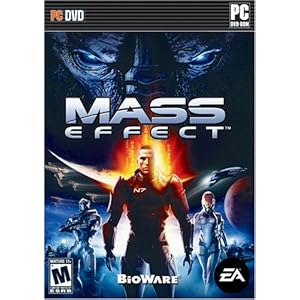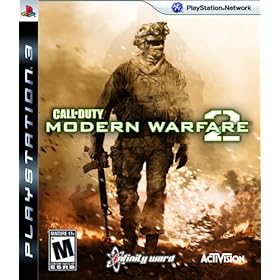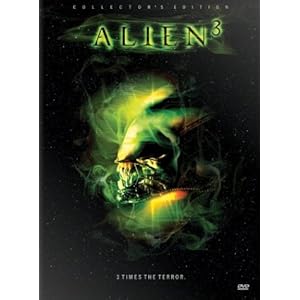
I've mentioned before that Star Wars: Knights of the Old Republic is the game that got me into western RPGs. So I guess it's not a surprise that I quite enjoyed BioWare's return to the science fiction landscape. Mass Effect takes place within its own original universe, although the influences on both the design and the setting from that game and other classic science fiction are obvious. Without being a real expert on the history of the genre, I'd say the two most obvious influences on Mass Effect's world are Star Wars and Star Trek. You have the former's quasi-mystical powers and diverse alien species (Trek has aliens, but they all look like people with weird foreheads), and the latter's more adult focus on politics and how a gathering of races from across a galaxy would form a society and government together. The final result is a bit darker than both at their more adventurous, but the impact is there. There's literally an encyclopedia in the game's pause menu if you ever want to look up details on the history and specifics of pretty much any piece of back story it cares to bring up, and the amount of thought put into everything is one of the game's biggest assets.
You play as Shepard, a customizable protagonist and eventual commander of the most advanced ship in the alliance fleet. The alliance is sort of like a more militaristic Starfleet, except it only represents human interests in the galaxy. There's no real shared military, although the alliance have a working relationship with the council, a multiracial tribunal that operates out of an ancient space station called the Citadel and has influence over many things. I'm really explaining a lot of background here, aren't I? It's an interesting set up. Anyway at the beginning of the game you are given a mission that will require a ship and an elite team, and you report to both the council and the alliance. It's pretty easy to fill out your party, and from there you generally have a choice of planets with important objectives to complete. There are also dozens of optional worlds you can visit, but I'll get to those later. You fight evil robots, help or ignore troubled people you come across, talk a lot, and try to track down and stop the bad guy.
The game likes to pretend sometimes that it's a primarily a cover-based third person shooter, since those have been popular for a few years and were really blowing up when it came out, but it really isn't. Yes, you can hide behind objects and point a target at enemies and click to fire, but success is less determined by an ability to aim and shoot and more by good management of your allies, use of abilities, and having stats good enough for an invisible random variable to decide that your shots hit more than the other guy's. This didn't bother me as much as other people, I just don't see the point of the charade. Knights of the Old Republic's combat system was plenty of fun, and totally honest. You paused the game to assign actions, and chance and numbers determined whether your light saber swings and blaster shots hurt the enemy. Mass Effect playacting as a shooter just distracts from what could have been a more interesting system. I understand that the sequel actually performs like a true shooter, which is a fine direction to take, as it's at least a more genuine attempt to reach beyond the standard number-crunching RPG player.
So while I lived with the combat, what I really liked was simply learning about the different cities and outposts I was exploring, and developing my relationship with the various people in my crew. RPGs always seem to do better at creating a camaraderie amongst an interesting cast of characters than other games, if only because they actually take time to do so. And I liked my crew a lot. I talked to them after every job to see what they thought, and I did all the side quests that tied directly to their characters, not for the rewards, but because I wanted to help them out. They're a diverse group, and while the dialogue was often a bit straightforward, I still felt some level of connection to them that I just don't usually. I found myself choosing who to take on expeditions based on who it made sense to bring, not who would statistically help me in combat the most, and some of the things that happen to some of them later in the story actually made me feel a bit of emotion. It lent weight to the morality system, which is mildly interesting because it determines more what kind of leader you are rather than whether you're good or evil, but otherwise is still pretty standard.
I guess I should mention the game's biggest weaknesses, the silly mini-game that seems to determine a little too much of what happens, and the Mako, a vehicle which popped up way too much based on how much of a headache it was. Frequently when activating objects in the game, you have to solve a little game where you guide an arrow into the center of a circle while objects rotate around it nearby that you have to avoid. Fail to do so, and you either have to try again or pay a material cost to bypass it. It made some sense when trying to break electronic locks, but the game uses it for much more than that, including recovering objects from wreckage and even surveying rocks for minerals. It's a huge pain in the ass and never really makes sense in context. And man, the Mako. It's an armored jeep type thing that goes over a lot of terrain, but it's a gigantic annoyance whenever you have to use it, which is often on required story missions, and always when exploring optional planets for useful objects. It controls like crap, it's not as useful as it feels like it should be in combat, and none of the places you use it in are designed well enough to get past this. It's just a struggle every time you're behind the wheel. It would have been a bigger issue if it was at its worst when it's actually necessary, but thankfully that's not the case.
Beyond those small issues, I had a lot of fun in the twenty hours the game took me. The story was pretty good, conveyed by some decent writing and well acted by the cast, including a smattering of recognizable celebrity voices that fit their parts appropriately. The game's presentation helps immensely, although I was unable to get the full effect of the motion capture thanks to the constantly poor frame rate on my machine. I'll admit it's an old system, but it probably shouldn't have run a three year old game this choppily. BioWare's games have always had odd technical issues on the PC, and I have to imagine it's partly the game's fault as well as my computer's, because I began Dead Space recently, which came out a year later, and it can at least do static conversations smoothly. It was rare for the issues to actually impact gameplay negatively, but it was an unfortunate distraction a lot of the time. It sounded pretty good though, with the previously mentioned voice acting and strong score helping to sell the universe. Whatever problems I had, I wanted to play the sequel as soon as I finished, which is not something I've been able to say much recently. I guess the question is whether I'll play it on PC, or if the way they handle the PS3 version makes it seem worth the switch.
Tuesday, August 31, 2010
Mass Effect
Sunday, November 22, 2009
Call of Duty: Modern Warfare 2

Or just Modern Warfare 2, as Infinity Ward clearly wanted to call it from the fact that the words "Call of Duty" don't appear anywhere in the game or on packaging for special editions. MW2 is the follow-up to the last game the series' actual creators made two years ago, and picks up five years later. The fate of a few characters is left up in there, but main protagonist Soap returns as a grizzled veteran with a voice (Kevin McKidd's) of his own, taking Price's place as ally in the field and friendly voice in your ear during the game's consistently better missions as a British special operative instead of a US soldier. While the first game's antagonist was defeated, the world is still unsafe as some Russian extremists still believe in his cause and conflict continues in the middle east. You still bounce between multiple characters, trotting across the globe to find and kill new people.
The first game seemed at the time to be somewhat plausible, presenting an interesting military plot punctuated by a couple shocking, unexpected moments. Modern Warfare 2 is much more over the top, constantly in your face with plot twists, betrayals, and every action movie gimmick you can think of. It sort of tosses the believability out the window in an early scene intended to disgust the player, and it mostly succeeds at this goal, but at the cost of your superiors looking like bone-headed morons and doing things that a reasonable government would never consider. Later events make you wonder if things were really as they seemed, but still, you can tell that their goal this time was to tell an exciting story, not represent modern conflict on a realistic, global scale. Bits intended to startle or shock the player are more frequent albeit less effective, because you can pull off the same trick so many times before it becomes old hat. There are a few occasions where they play with your expectations successfully and some true surprises, and in the end I accepted what they were doing and enjoyed the ride. It's just clear at this point that the developers' intentions with the franchise have changed.
Like pretty much any Call of Duty game, the missions are a grab back of solid shooting, truly excellent set pieces, and occasional total clunkers. They never seem to be able to stay away from a level or two where the enemies are just too frequent and too accurate and you just get pinned down from every direction, so your frustration just mounts as you continually restart and muscle your way through by memorizing where they come from. Luckily they get that out of the way early this time, and the latter part of the game is characterized by things that are constantly new and exciting. The single player campaign is fairly short, but these days that's a good thing - five to six hours of original, constantly changing, high quality gameplay are more than enough to satisfy anyone who isn't made of free time. Missions where you sneak through enemy territory with a buddy picking off stragglers are always fun, and even the more bombastic levels are enhanced by the somewhat unsettling locations they take place in this time.
The game looks and sounds great as expected. Solid sound with nice effects, good voice from a mix of recognizable names and industry veterans, and music that always manages to fit the appropriate mood. The textures of some unimportant details are surprisingly bland looking, but anything they wanted to look awesome usually does. And for people who don't play Call of Duty for the story mode, the multiplayer looks intact with some new features, and Spec Ops is an interesting way to extend the game's life without implementing actual co-op into their carefully planned single player. Infinity Ward is still setting the golden standard in competitive online shooting on consoles, and they just happened to put the best one player campaign this side of the Half-Life series in there too.
Saturday, October 31, 2009
Alien³

Unlike Aliens, Alien 3 doesn't do much of anything that the first movie didn't. It answers the question of how to make a single one of the creatures scary again after Ripley fought off hordes the last time: replace the marines with bald, British criminals and take away their weapons. This time, the alien bursts out of an animal instead of a person, resulting in slightly different physiology. In some ways, it's the best looking of the first three films, with superior gore effects and a good looking alien. But whenever the shot is wide enough to see the entire thing visible, it ends up being horribly composited with the rest of the picture and actually looking worse than if they just cheated more with the camera work.
This was actually David Fincher's first feature film, though unfortunately not a very good one, and thanks to disputes with the studio he's basically disowned it. It's hard to say how much of the movie's badness is the result of outside tampering and how much is it just being a bad movie. It seems more hateful than the first two. The series is known for the vast majority of its characters dying, but this one kills off three survivors from the last movie in the beginning for no real reason. The setting is weird, and the surrounding cast this time is kind of dull, with every person sort of being the same dude. Aliens expanded on the series' scope, and Alien 3 draws it back, just trying to make some money without doing much that'll make it seem worth the time. Honestly, I can't think of many reasons I shouldn't just call it awful. The ending is unexpected and pointed, thought it didn't stop them from making yet another sequel five years later. I'm gonna go think about something else now.
Friday, October 30, 2009
Aliens

It's a damn shame it took James Cameron fifteen years to finally get back to directing action films. In just a decade spanning the 80s and 90s, he made four of the best and most original such movies in that period, plus The Abyss which was okay I guess. Alien still holds up and is worth watching, but this is the movie I regret not seeing until now. I've heard of its influence on the aesthetic of many modern video games over and over, and that rang pretty true while I was watching. Aliens takes the setting and style of the first movie, and amps up the intensity and excitement tenfold. It begins with Ripley finally being discovered and awoken from her frozen state fifty seven years after the first movie, not long after her previously unmentioned daughter, that she remembers as being ten, dying an old woman. It's kind of a convenient way to add emotion to the revelation, but Cameron does a good job of carrying the motherhood thread through the rest of the story. A colony has been established on the planet where the first alien was discovered, and she goes on a mission with a unit of soldiers to try to prevent things from going to hell. You can guess whether they succeed.
The movie maintains some of the horror elements of the first film, but mostly establishes its own personality with the various wisecracking marines and the added danger of a species that is now mostly fighting on its own turf. They expand on the question of the creatures' biology, and where they all come from. The action doesn't have the specific complexity of more modern movies, but there's a real sense of chaos and danger as they basically wage war on each other. A few of the characters are somewhat annoying, but you come to regret each of their deaths and root for their triumphs. The aliens are generally pulled off better than in the first movie, with some clever filming to hide the fact that they're, you know, not real, and the final obstacle is a particularly impressive bit of practical effects work. The climactic moments are as strong as in any movie, and in the end Aliens is a great, satisfying action movie, dark but not as depressingly bleak as the rest of the series. Just watching it made me more optimistic for Avatar.

































